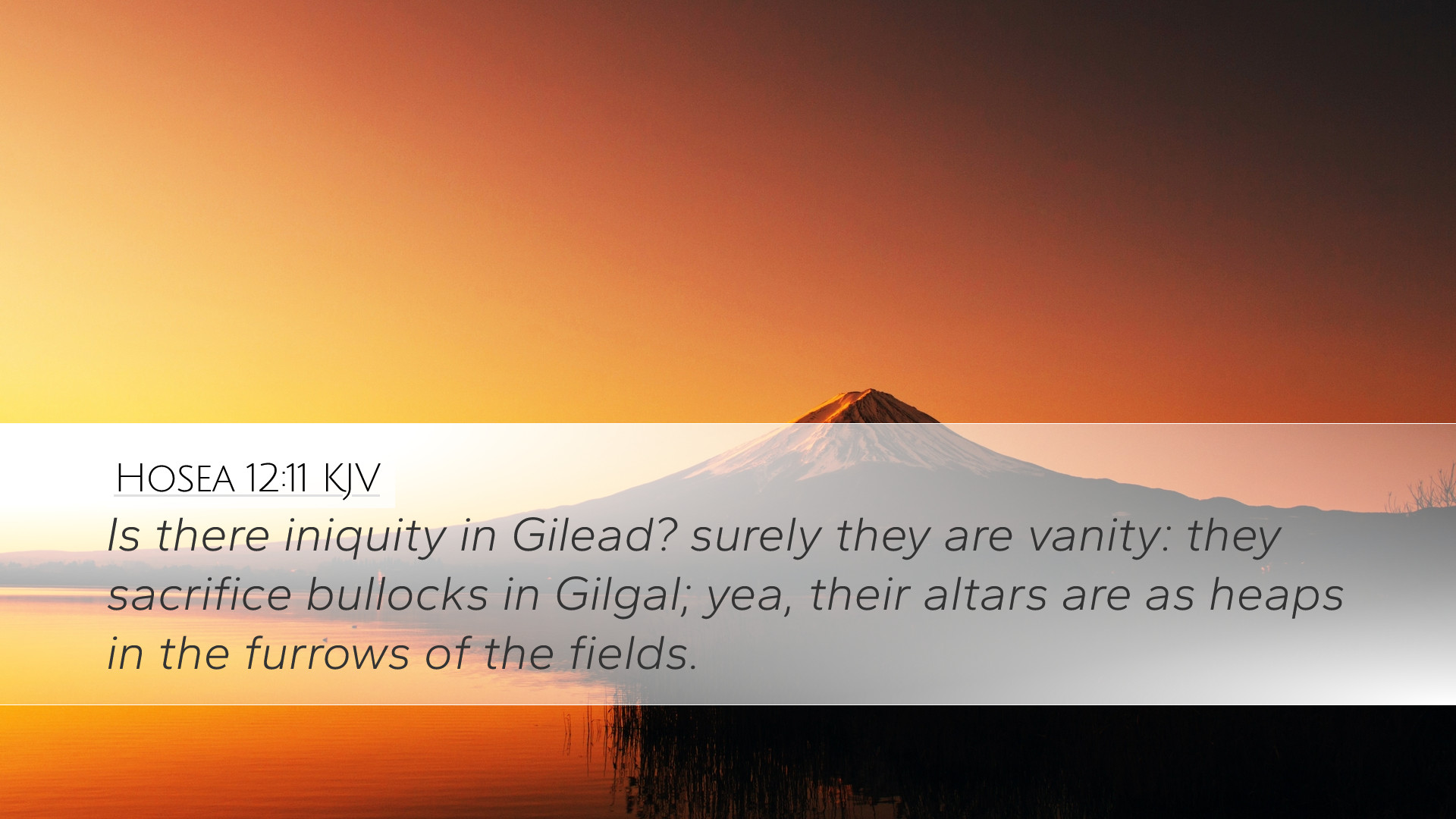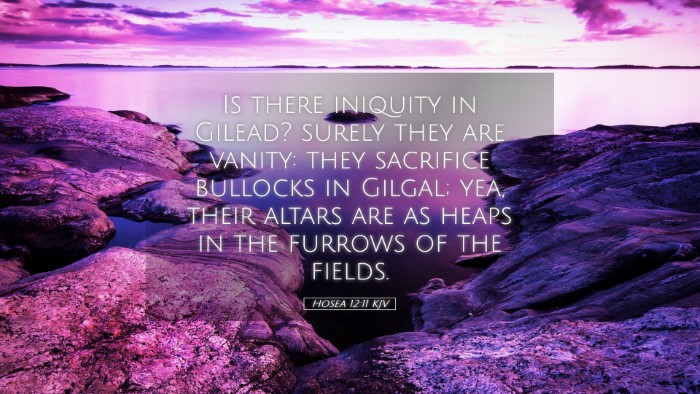Old Testament
Genesis Exodus Leviticus Numbers Deuteronomy Joshua Judges Ruth 1 Samuel 2 Samuel 1 Kings 2 Kings 1 Chronicles 2 Chronicles Ezra Nehemiah Esther Job Psalms Proverbs Ecclesiastes Song of Solomon Isaiah Jeremiah Lamentations Ezekiel Daniel Hosea Joel Amos Obadiah Jonah Micah Nahum Habakkuk Zephaniah Haggai Zechariah MalachiHosea 12:11
Hosea 12:11 KJV
Is there iniquity in Gilead? surely they are vanity: they sacrifice bullocks in Gilgal; yea, their altars are as heaps in the furrows of the fields.
Hosea 12:11 Bible Commentary
Bible Commentary on Hosea 12:11
Verse Text: "Is there in Gilead iniquity? Surely they are vanity: they sacrifice bullocks in Gilgal; yea, their altars are as heaps in the furrows of the fields."
Introduction
The Book of Hosea carries a profound message of love, judgment, and redemption intended for both Israel and its surrounding nations. Chapter 12, in particular, highlights Israel's waywardness and hypocrisy, as well as their distorted religious practices, juxtaposing their ritualistic worship against the true standards of righteousness prescribed by God. Hosea 12:11 presents a critical observation regarding the empty rituals performed by the Israelites, particularly in Gilead and Gilgal.
Commentary Overview
This commentary synthesizes insights from various public domain commentators including Matthew Henry, Albert Barnes, and Adam Clarke to elucidate the significance of Hosea 12:11.
Historical and Theological Context
Hosea is writing during a period of spiritual decline for Israel, characterized by idolatry and the abandonment of covenant faithfulness. In the midst of political turmoil and moral decay, the people engaged in ceremonial acts of worship, believing that these practices could appease God despite their sinful lives.
Insights from Matthew Henry
Henry reflects on the significance of Gilead's reputation, stating that it was known for its balm and healing properties, yet it had become a hub of iniquity. This irony illustrates how even a place that was meant to signify healing had become associated with sinfulness. He notes:
- That the sacrifices made in Gilgal were devoid of spiritual sincerity, reflecting a people caught in the cycle of outward devotion while neglecting moral integrity.
Henry emphasizes the emptiness of their worship, likening their altars to “heaps in the furrows of the fields” — a vivid metaphor demonstrating the true state of their worship: unrecognized, unvalued, and of no genuine effect.
Insights from Albert Barnes
Barnes elaborates on the spiritual state of Israel, asserting that despite their religious fervor, they engaged in practices that were fundamentally flawed. He asserts:
- The sacrifice of bullocks in Gilgal signifies an attempt to follow religious protocols without the corresponding righteousness in their personal conduct.
- The altars in this context symbolize not merely the physical structures but the entirety of Israel’s warped spiritual condition.
Barnes advises that true worship is measured not merely by external rites but by an inner commitment to justice and faithfulness, which the Israelites sorely lacked.
Insights from Adam Clarke
Clarke points out that the question “Is there in Gilead iniquity?” serves as both a reflection and an indictment of Israel’s transgressions. His understanding shows a deep concern for the nature of sin within a land once viewed as holy:
- The “vanity” of their sacrifices signifies a hollow worship that fails to satisfy God’s demands, highlighting a disconnect between their offerings and ethical living.
Clarke notes the importance of examining the heart behind religious observance, critiquing how Israel's insincerity rendered their altars ineffective.
Exegesis of Key Themes
1. The Nature of True Worship
Through this verse, the urgency for true worship that encompasses ethical living alongside ritual engagement is emphasized. The contrast between external observance and internal faithfulness is a critical theme throughout Hosea and echoes throughout the entirety of biblical teaching. Worship must emerge from a pure heart and not merely be an outward form.
2. Idolatry and Ritualism
The rituals performed in Gilgal represent a dangerous trend toward ritualism, where form is maintained but the spirit is lost. This is a warning that resonates with modern practices of worship, challenging participants to assess their motives and the authenticity of their devotion.
3. Consequences of Hypocrisy
The verses highlight the consequences of hypocrisy in worship. God, who desires truth in the inward parts (Psalm 51:6), cannot be pleased with sacrifices separated from genuine dedication to Him. Israel's transgressions have led to a spiritual barrenness, manifesting in their ineffective worship.
Concluding Thoughts
The insights on Hosea 12:11 invite deeper contemplation among pastors, students, theologians, and scholars. There is an urgent call to uphold the integrity of worship — one that is abundant in sincerity and aligned with righteous living. The theological implications of this verse demand that the modern church—like ancient Israel—be on guard against the allure of ritualism and strive for a genuine, holistic approach to worship that encapsulates both heart and action.
As we reflect on this passage, let it challenge our own worship practices and inspire us to seek a deeper relationship with God that prioritizes authenticity over mere ritual.


